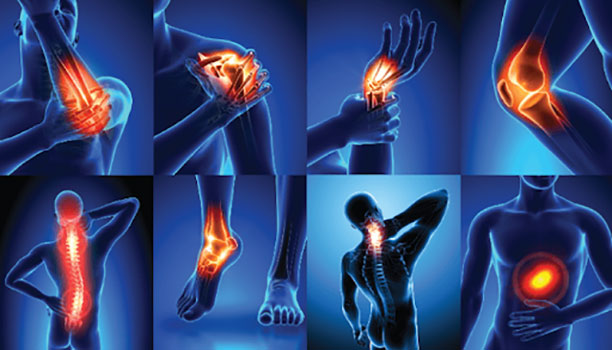How Long Will Joint Pain Last? Understanding Joint Pain and Effective Remedies

Strong 8k brings an ultra-HD IPTV experience to your living room and your pocket.
Joint pain is a common ailment that affects millions of people worldwide. It can be caused by a variety of factors, including ageing, injuries, or arthritis. Some people have joint pain that is bothersome but only lasts a short while, while others develop it into a chronic condition that interferes with day-to-day activities. Although there are many different causes of joint pain, one of the most common queries people have is, "How long does joint pain last?" We will investigate this exact question as well as potential causes of joint pain and effective management techniques.
What Causes Joint Pain?
Joint pain occurs when there is discomfort in any of the joints of the body, such as the knees, hips, shoulders, or hands. There are several reasons for joint pain, including:
Osteoarthritis: This is the most common form of arthritis and typically affects older adults. It occurs when the cartilage that cushions the joints breaks down over time, leading to pain and stiffness.
Rheumatoid Arthritis: An autoimmune disorder where the body’s immune system attacks the synovial membrane, which lines the joints. This leads to inflammation and pain.
Injuries: Accidents or trauma, such as fractures or sprains, can lead to joint pain.
Gout: A form of arthritis caused by the buildup of uric acid crystals in the joints, causing sudden and intense pain.
Bursitis: Inflammation of the bursae, which are small sacs of fluid that cushion the joints.
Tendinitis: Inflammation of the tendons, often caused by overuse or repetitive movements.
How Long Does Joint Pain Last?
The duration of joint pain depends on the underlying cause and the individual’s overall health. In some cases, joint pain can be temporary and may go away on its own. In other instances, it can last for a longer period and may require medical intervention.
Acute Joint Pain: If the joint pain is caused by an injury, such as a sprain or strain, it may last for a few days to a few weeks. Rest, ice, compression, and elevation (R.I.C.E.) are commonly recommended treatments for acute joint pain. Over-the-counter pain relievers, such as ibuprofen, can also provide relief.
Chronic Joint Pain: If the joint pain is caused by conditions like osteoarthritis or rheumatoid arthritis, it can be long-lasting or even permanent. Chronic joint pain may come and go in flare-ups, and its intensity can vary over time. Management of chronic joint pain typically involves a combination of medication, physical therapy, and lifestyle changes.
Post-Surgical Joint Pain: If the joint pain is related to surgery, such as a joint replacement, it may take several months to a year to fully recover. Pain may persist for a while but should gradually improve as the joint heals.
Factors That Affect the Duration of Joint Pain
The duration of joint pain can be influenced by several factors:
Age: As we age, the cartilage in our joints can wear down, which may lead to chronic conditions like osteoarthritis.
Injury: The severity of the injury plays a significant role in how long the pain will last. A mild injury may heal in a few weeks, while a severe injury may take longer to recover from.
Overall Health: People with underlying health conditions such as obesity, diabetes, or autoimmune diseases may experience joint pain for a longer period.
Treatment: Early and effective treatment can significantly reduce the duration of joint pain. The longer you wait to seek help, the more likely the pain may become chronic.
Managing Joint Pain: Natural Solutions
While joint pain can be challenging, there are several natural remedies that can help reduce discomfort and promote healing. Here are a few options to consider:
Exercise and Physical Therapy: Regular exercise helps maintain joint flexibility and strengthens the muscles around the joints, which can reduce pain. Low-impact exercises such as swimming, cycling, or walking are great choices for those with joint pain. Physical therapy can also help by teaching you exercises that specifically target your painful joints.
Weight Management: For those with knee pain or other joint issues, losing excess weight can help reduce the stress on the joints, particularly the knees, hips, and lower back. Even a modest weight reduction can have a significant impact on reducing joint pain.
Hot and Cold Therapy: Applying heat or cold to the affected area can help reduce inflammation and relieve pain. Cold compresses can numb the pain and reduce swelling, while heat can help relax stiff muscles and improve circulation.
Herbal Remedies: Certain herbs and natural supplements have been shown to provide relief from joint pain. These include turmeric, ginger, and Boswellia. These herbs have anti-inflammatory properties that can help reduce joint pain.
Ayurvedic Solutions: Ayurveda offers a range of natural remedies to treat joint pain, emphasizing a holistic approach to health. One such remedy is Orthorun Ayurvedic Powder, a natural solution that has been gaining popularity for treating joint pain, especially in the knees. This Ayurvedic powder combines traditional herbs to provide relief from joint discomfort, reduce inflammation, and promote overall joint health. For more information, you can explore Sukhyam Ayurveda's Orthorun Ayurvedic Powder.
Sukhyam Ayurveda: A Trusted Name in Joint Pain Relief
Sukhyam Ayurveda is a leading name in Ayurvedic healthcare, offering a range of natural products designed to promote overall health and well-being. Their Orthorun Ayurvedic Powder is an excellent example of how Ayurveda can be used to manage joint pain naturally. This product has been carefully formulated using time-tested Ayurvedic ingredients to target joint inflammation and discomfort.
Sukhyam’s products are known for their purity, effectiveness, and commitment to using natural, sustainable ingredients. Whether you're dealing with knee pain, joint stiffness, or inflammation, Sukhyam Ayurveda has the solution for you. The Orthorun Ayurvedic Powder not only addresses the symptoms of joint pain but also promotes long-term joint health. You can find more about this amazing product at Sukhyam Ayurveda.
When to Seek Professional Help
While natural remedies can be effective in managing joint pain, it is essential to seek professional medical advice if the pain is persistent or severe. If you experience any of the following, it’s crucial to consult a healthcare provider:
Pain that lasts for several weeks or longer.
Joint pain that is accompanied by swelling, redness, or warmth.
Difficulty moving the joint or performing everyday tasks.
Sudden, severe pain following an injury.
In such cases, a doctor or specialist can help diagnose the cause of your joint pain and recommend appropriate treatments, which may include prescription medications, injections, or surgery.
Conclusion
Joint pain can last anywhere from a few days to several years, depending on its cause and the individual's health. Whether it's a temporary injury or a chronic condition like arthritis, joint pain can be managed with proper treatment, lifestyle changes, and natural remedies. If you’re looking for a natural solution, consider trying Orthorun Ayurvedic Powder from Sukhyam Ayurveda, a trusted name in Ayurvedic healthcare. Their products are designed to provide long-term relief from joint pain and promote overall joint health.
By taking a proactive approach, you can manage your joint pain and live a more comfortable, active life.
Note: IndiBlogHub features both user-submitted and editorial content. We do not verify third-party contributions. Read our Disclaimer and Privacy Policyfor details.


